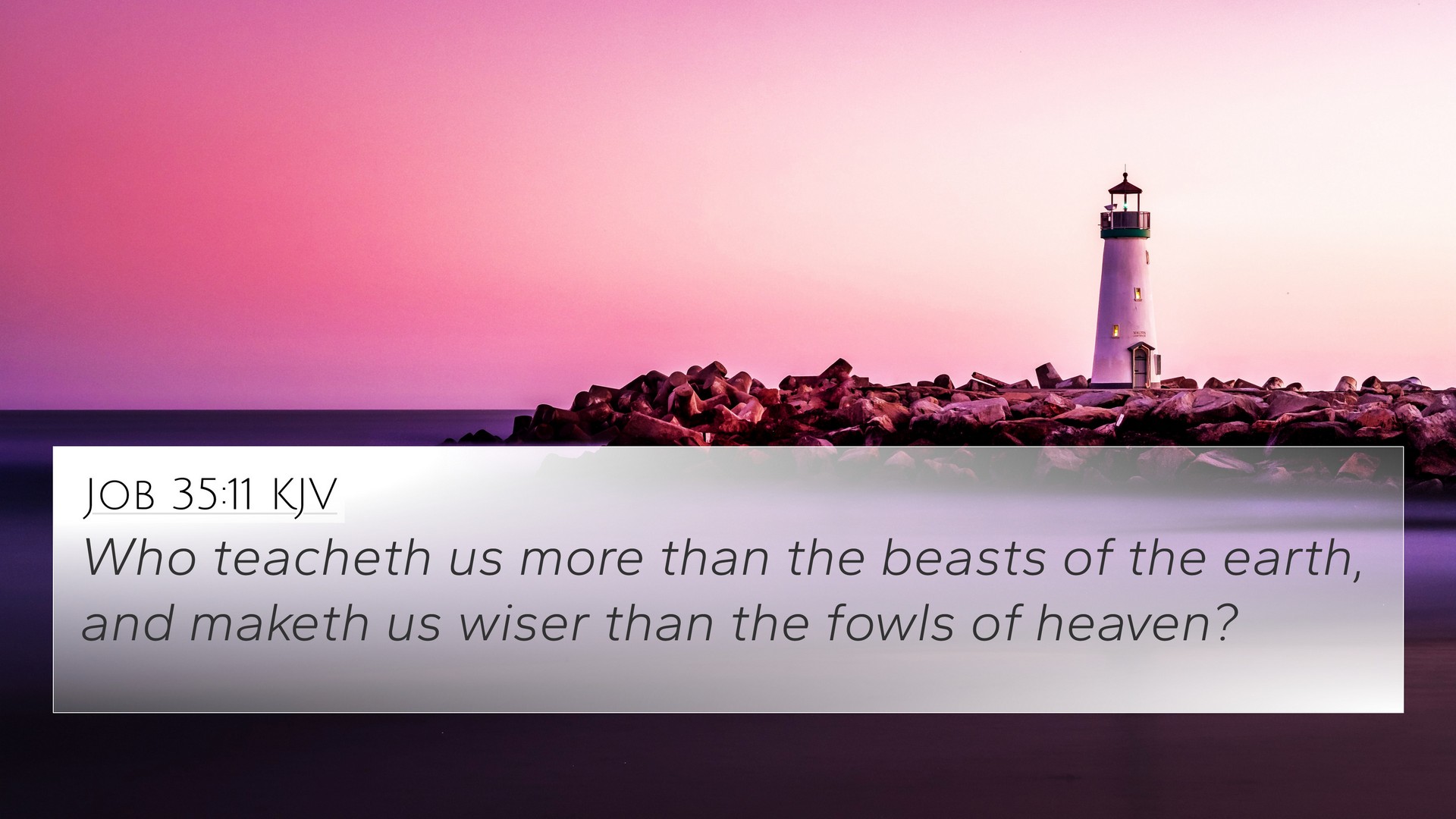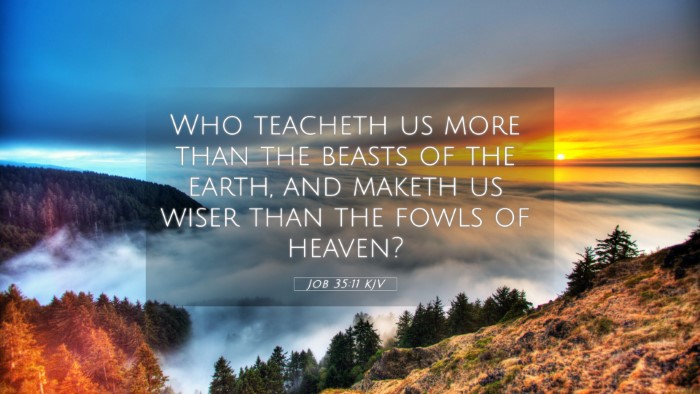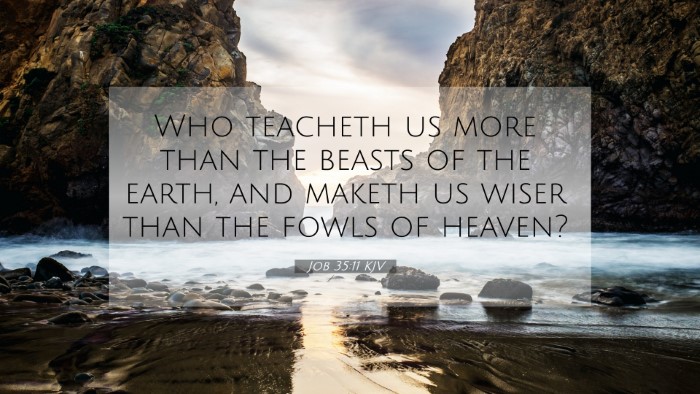Old Testament
Genesis Exodus Leviticus Numbers Deuteronomy Joshua Judges Ruth 1 Samuel 2 Samuel 1 Kings 2 Kings 1 Chronicles 2 Chronicles Ezra Nehemiah Esther Job Psalms Proverbs Ecclesiastes Song of Solomon Isaiah Jeremiah Lamentations Ezekiel Daniel Hosea Joel Amos Obadiah Jonah Micah Nahum Habakkuk Zephaniah Haggai Zechariah MalachiJob 35:11 Similar Verses
Job 35:11 Cross References
Who teacheth us more than the beasts of the earth, and maketh us wiser than the fowls of heaven?
Uncover the Rich Themes and Topics of This Bible Verse
Listed below are the Bible themes associated with Job 35:11. We invite you to explore each theme to gain deeper insights into the Scriptures.
Job 35:11 Cross Reference Verses
This section features a detailed cross-reference designed to enrich your understanding of the Scriptures. Below, you will find carefully selected verses that echo the themes and teachings related to Job 35:11 KJV. Click on any image to explore detailed analyses of related Bible verses and uncover deeper theological insights.

Psalms 94:12 (KJV) »
Blessed is the man whom thou chastenest, O LORD, and teachest him out of thy law;
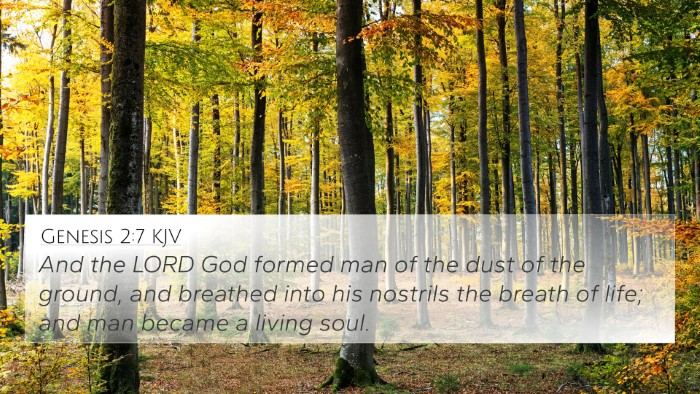
Genesis 2:7 (KJV) »
And the LORD God formed man of the dust of the ground, and breathed into his nostrils the breath of life; and man became a living soul.
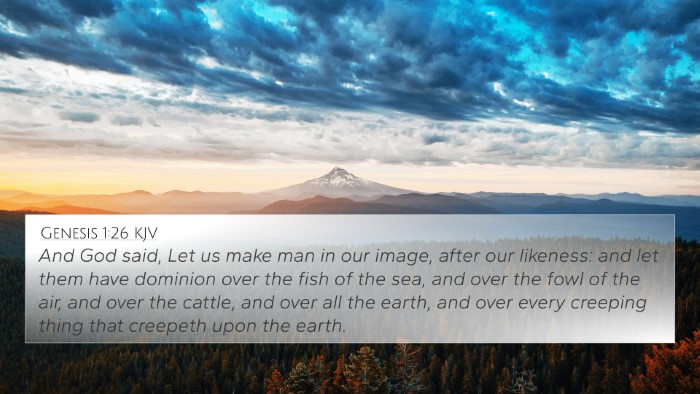
Genesis 1:26 (KJV) »
And God said, Let us make man in our image, after our likeness: and let them have dominion over the fish of the sea, and over the fowl of the air, and over the cattle, and over all the earth, and over every creeping thing that creepeth upon the earth.

Job 32:8 (KJV) »
But there is a spirit in man: and the inspiration of the Almighty giveth them understanding.
Job 35:11 Verse Analysis and Similar Verses
Understanding Job 35:11: A Comprehensive Analysis
Job 35:11 states: "Who teaches us more than the beasts of the earth, and makes us wiser than the fowls of heaven?" This verse underscores the significance of divine wisdom and the awareness that humans possess knowledge beyond that of animals, reflecting a clear distinction between humanity and the rest of creation. Below is a summarized analysis incorporating insights from various public domain commentaries.
Verse Meaning and Context
In the context of Job's discourse, Elihu emphasizes that God teaches humans valuable lessons through nature. The animals and birds, although instinctively wise, lack the higher understanding that is imparted to humanity by God.
Insights from Matthew Henry
Henry interprets this verse as a call to recognize God's teaching through creation. He suggests that animals act instinctively, which shows that while they are wise, they do not possess the capacity for understanding that requires reflection and insight—qualities endowed upon humanity.
Insights from Albert Barnes
Barnes elaborates on the idea of divine instruction, positing that human wisdom extends beyond mere animal instinct through God's revelation and guidance. He encourages readers to acknowledge the lessons learned through observation of the natural world and to apply them in daily life.
Insights from Adam Clarke
Clarke emphasizes the role of God as the ultimate teacher who imparts wisdom to humanity. He remarks on the contrast between human intelligence, influenced by divine knowledge, and animal instincts, which are purely instinctive responses to their environment.
Connections to Other Scriptures
Job 35:11 connects with several other Biblical texts, highlighting thematic overlaps regarding divine wisdom and human understanding:
- Proverbs 2:6: "For the Lord gives wisdom; from His mouth come knowledge and understanding." This reinforces the notion that true wisdom is bestowed by God.
- Psalm 32:8: "I will instruct you and teach you in the way you should go; I will counsel you with My loving eye on you." God’s teaching is a recurring theme.
- Isaiah 40:26: "Lift up your eyes on high and see who has created these things." This verse underlines the importance of recognizing God's handiwork in nature.
- Matthew 10:29: "Are not two sparrows sold for a copper coin? And not one of them falls to the ground apart from your Father’s will?" This indicates God’s intimate knowledge of even the smallest creatures.
- Luke 12:24: "Consider the ravens, for they neither sow nor reap, which have neither storehouse nor barn; and God feeds them." This illustrates the wisdom found in observing nature.
- 1 Corinthians 1:25: "Because the foolishness of God is wiser than men, and the weakness of God is stronger than men." Here, Paul emphasizes divine wisdom surpassing human intelligence.
- James 1:5: "If any of you lacks wisdom, let him ask of God, who gives to all liberally and without reproach." This invites believers to seek divine wisdom actively.
- Job 12:7-9: "But ask now the beasts, and they will teach you; and the birds of the air, and they will tell you; or speak to the earth, and it will teach you; and the fish of the sea will explain to you." This highlights the interconnectedness of creation in imparting wisdom.
Thematic Connections and Applications
Job 35:11 invites readers to reflect on how life lessons manifest through nature and God's teachings:
- Nature as a Teacher: The verse reminds us to observe the world around us, acknowledging the messages it conveys through the behaviors of animals.
- Human Distinction: This verse underlines the unique position of humanity as being created in the image of God, endowed with reason and moral responsibility.
- Seeking Wisdom: Emphasizes the importance of pursuing knowledge and understanding through prayer, study, and observance.
Conclusion
Job 35:11 serves as a powerful reminder of our relationship with God and His creation, illustrating the distinction between instinct and intellect. It encourages believers to observe, learn, and grow in wisdom, fostering a deeper understanding of their place in the universe.
